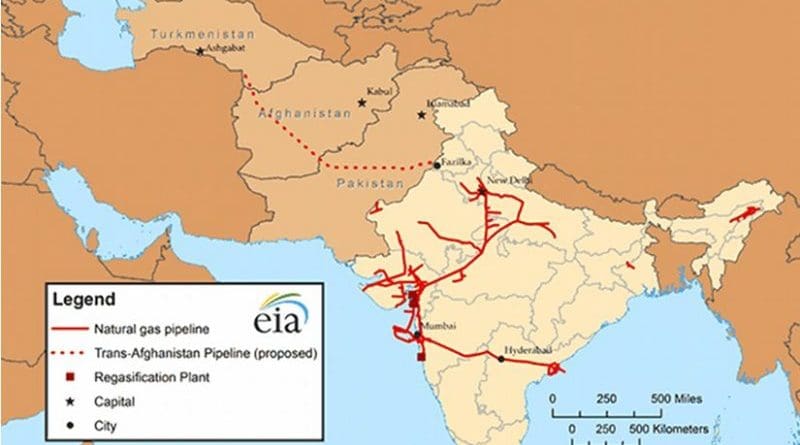Less Explored Foreign Policy Options And Connection Between TAPI-CPEC And Afghanistan – OpEd
After the collapse of the Soviet Union and the formation of the Central Asia Republics (CARs), foreign policies for those countries — with their huge economic potential — haven’t been sufficiently explored with respect to Pakistan.
Despite the fact that being located in the same region and exceptionally sharing common characteristics, the geopolitical and geoeconomic importance of Pakistan and CARs should naturally stimulate the two sides to reach out to each other.
Pakistan has always sustained a hope to become a gateway to Central Asia, but other than occasional efforts, the two sides have not been successful in forging closer political and economic relations — even after a period of three decades, Pakistan is yet to make any breakthrough into the Central Asian region.
Even though their immense richness in term of energy and other natural resources, Pakistan has not benefited at the required levels at least to address its energy issues through the bilateral relations with these countries. The gas fields of the Uzbekistan are not only overlooked, but if the Turkmenistan-Afghanistan-Pakistan-India (TAPI) were connected with the CPEC, the region could link the natural gas resources of Uzbekistan to easily overcome the Pakistan’s energy crisis and would help boosting the ties of the country with all the states in Central Asian region.
The Central Asian region’s vast untapped natural resources are landlocked — having no sailing route and sea connection to the rest of the world, which is actually one of the foremost drawbacks that also decrease the chances of the trade and the exporting of resources from this region. Even so, and located in the immediate neighborhood, the South Asian region is colossally energy-starved.
However, together with the Gwadar Port of Pakistan and the China-Pakistan Economic Corridor (CPEC) project there is incomparable potential to spectacularly make over the regional dynamics in terms of trade and investment and the development. It would be without any exaggeration to actually call it a game changer that would of course lift the lives of about 3 billion people across China, Central Asia, South Asia and the Middle East. The Gwadar and the CPEC have outstandingly brought the strategic and economic moments in favor of Pakistan and has created a wide range of opportunities for the country where it has assumed the position of economic pivot for the whole region.
The Central Asian States also utter enthusiasm of a regional linkage and eagerly are desirous to benefit from the projects that will remarkably assist in connecting the Central Asian countries for trading and exporting their energy resources to the European markets. Moreover, with the advent of China-Pakistan Economic Corridor (CPEC), the regional geopolitics has also assumed new characteristics where the region and their people are going to be better connected than ever before.
Notably, during the recent visit of Turkmenistan’s President Gurbanguly Berdimuhamedov in March 2016, the two sides keenly agreed to overcome their detachment and explore the options on enhancing trade, economic relations, energy sharing, people-to-people contacts and the tourism. The particular focus also remained on the timely completion of the projects of extraordinary importance ranging from the Turkmenistan-Afghanistan-Pakistan-India (TAPI) pipeline to Dushanbe’s potential linkup with the CPEC.
Moreover, given the unique geoeconomic and geopolitical significance of both sides, Pakistan and Turkmenistan decided to pay special attention to establishing air, road and rail links on a priority basis.
The greater interests of the two sides link with the TAPI and the CPEC that would further move forward to improve the regional connectivity and serve the economic activity. The emergence of the CPEC is unusually an incomparable trade route to discover the potential or the region besides; Pakistan’s accession to the TIR (international road transport) convention is another surplus opportunity whereas; the TAPI could provide crucial linkage to CPEC. Nevertheless, with the initiation of the CPEC Project, the manifold options have increased the optimism about Pakistan benefiting from lucrative foreign trade and investment whereas, the Central Asian states into jumping aboard as well.
Finally, to make the long cherished dreams a resounding success, the reality lies with the facts of regional peace and stability. Nevertheless, the chaotic security situation in Afghanistan is purely a factor that could seriously undermine and hinge the linkage between Pakistan and the Central Asian States. The unstable political and security situation in Afghanistan has gloomy repercussions for the rest of the region and the main reason for the delay in timely execution TAPI project conceived since 1990s. Aware of its importance Pakistan considers the TAPI project a ‘trailblazing project’ that enables the region to become an energy hub and source of diplomatic networking but however, all possible efforts should be made to address the Afghan issue at priority basis. The region’s economic development mainly depends on the fact that TAPI will only work if there is peace and stability in Afghanistan since the pipeline will pass through northeastern part of that country.
* The writer works for the Strategic Vision Institute, Islamabad and may be reached at [email protected]

